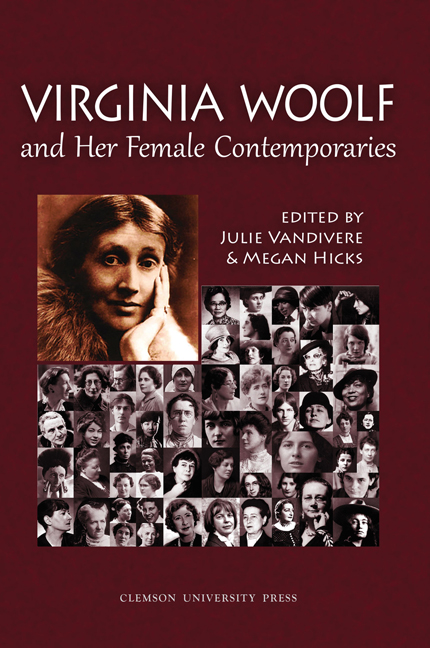Book contents
- Frontmatter
- Table of Contents
- Introduction
- Acknowledgments
- Abbreviations
- Who Are Virginia Woolf's Female Contemporaries?
- Virginia Woolf's Cultural Contexts
- Virginia Woolf's Contemporaries Abroad
- Reconfiguring the Mermaid: HD, Virginia Woolf, and the Radical Ethics of Writing as Marine Practice
- A Carnival of the Grotesque: Feminine Imperial Flânerie in Virginia Woolf 's “Street Haunting” and Una Marson's “Little Brown Girl”
- Mad Women: Dance, Female Sexuality, and Surveillance in the Work of Virginia Woolf and Emily Holmes Coleman
- Shop My Closet: Virginia Woolf, Marianne Moore, and Fashion Contemporaries
- Virginia Woolf and Victoria Ocampo: A Brazilian Perspective
- Making Waves in Lonely Parallel: Evelyn Scott and Virginia Woolf
- Critical Characters in Search of an Author: Cornelia Sorabji and Virginia Woolf
- “In my mind I saw my mother”: Virginia Woolf, Zitkala-Ša, and Autobiography
- Virginia Woolf's Contemporaries at Home
- Tribute to Jane Marcus
- Notes on Contributors
- Conference Program 223
Critical Characters in Search of an Author: Cornelia Sorabji and Virginia Woolf
from Virginia Woolf's Contemporaries Abroad
- Frontmatter
- Table of Contents
- Introduction
- Acknowledgments
- Abbreviations
- Who Are Virginia Woolf's Female Contemporaries?
- Virginia Woolf's Cultural Contexts
- Virginia Woolf's Contemporaries Abroad
- Reconfiguring the Mermaid: HD, Virginia Woolf, and the Radical Ethics of Writing as Marine Practice
- A Carnival of the Grotesque: Feminine Imperial Flânerie in Virginia Woolf 's “Street Haunting” and Una Marson's “Little Brown Girl”
- Mad Women: Dance, Female Sexuality, and Surveillance in the Work of Virginia Woolf and Emily Holmes Coleman
- Shop My Closet: Virginia Woolf, Marianne Moore, and Fashion Contemporaries
- Virginia Woolf and Victoria Ocampo: A Brazilian Perspective
- Making Waves in Lonely Parallel: Evelyn Scott and Virginia Woolf
- Critical Characters in Search of an Author: Cornelia Sorabji and Virginia Woolf
- “In my mind I saw my mother”: Virginia Woolf, Zitkala-Ša, and Autobiography
- Virginia Woolf's Contemporaries at Home
- Tribute to Jane Marcus
- Notes on Contributors
- Conference Program 223
Summary
This paper reminds its readers at the outset of that curious and irrepressible animal, the woolfenstein. Gertrude and Virginia might well have not liked each other, but those who have liked them, together and apart, “engender” of their lives, times and texts, “a monstrous intertext” based on the principle that texts (as well as authors of texts) are porous, inevitably “traversed by otherness” (Johnson 116). Critics and their subjects alike can be, are, woolfensteins, “digging up the bodies, sewing bodies into bodies, resituating women where they have been elided, erased” and “making themselves up of dead and living bodies” (DuPlessis 1989, 100).
In The Lure of the Modern (2001), writing within the relatively recent but firmly established tradition of postcolonial scholarship that seeks to redress the perpetuation of cultural imparities inherent in Eurocentric juxtapositions of modernist writers across the imperialist, imperializing divide, Shumei Shih roundly criticizes the potent, pleasurable grotesquery of such imagery as affectively obfuscatory, colluding with and vindicating the language of “expansion” (Mao and Walkowitz 738) that prefaces and prefigures the replacement of a Stein with, for instance, a Shuhua. Before, beside, and behind monstrous bodies expansion sidles, arrives obliquely, becomes implicit, and, therefore, tacitly admissible into liberal intellectual reckonings, failing to evoke the barbarity of the physical acts that have historically constituted it, adulterated again with the poignancy of adventure, the excitement of breaking new ground (which is, of course, another would-be playful expansionist metaphor of violence and violation).
Shih is referring specifically to Woolf 's 1938–39 epistolary encounter with Ling Shuhua, author of Ancient Melodies (1953), published by the Hogarth Press, and sometime lover of Woolf 's nephew Julian. Their admittedly productive relationship, Shih argues, reproduced the imbalance and inequality characteristic of the macrocosm it might be considered a metonym for. But as Patricia Laurence emphasizes in Lily Briscoe's Chinese Eyes (2003), the primary concern of the twenty-first-century geomodernist cannot still be whether Woolf 's correspondence with Shuhua was or was not carried out on entirely equal terms. Of course it was not.
- Type
- Chapter
- Information
- Virginia Woolf and Her Female Contemporaries , pp. 136 - 142Publisher: Liverpool University PressPrint publication year: 2016



